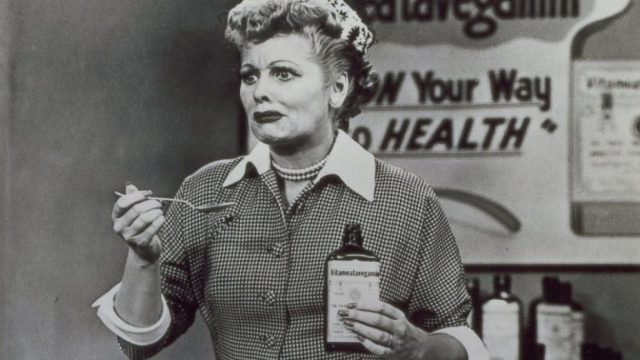It’s kind of awkward for me to admit this. It doesn’t make me a lot of friends. But I don’t love I Love Lucy. It’s got some sterling moments, but most of the running gags bother me. I don’t like how much of the relationship between Lucy and Ricky is a rivalry. Oh, yes, I know; they are obviously shown to love each other. It’s just one of those relationships where I’m not entirely sure why. She’s interested in what he does, but he has no interest in sharing it with her. And I’m not sure he even knows what she does all day. It really makes me uncomfortable, and the jokes stemming from that aren’t funny to me.
Lucille Ball, though? That is another place where my opinion isn’t popular. Though she’d be on my side with it. The simple fact is, she didn’t consider herself a great comedienne, either. It isn’t just that she thought Carole Lombard was better at it than she. It’s that, to her, being funny was work. Real, hard work. All those moments that come across as effortless onscreen were the product of an enormous amount of hard work on her part. She did not think she was naturally funny; I’ve even read that she wasn’t completely sure why things were funny sometimes, but she was assured they were and was willing to believe it. Which you hear more about Margaret Dumont, who actually was funny. So there we are?
So why am I writing about her? For that matter, since I prefer focusing on more obscure people whenever possible, why am I writing about one of the most famous actresses of the twentieth century? Because the place I think she’s most worthy of notice is one of the places she’s talked about least. It’s not her early career as a starlet alongside such luminaries as Ginger Rogers—they were actually in five movies together, and she’s fun in Stage Door. It’s not the handful of serious dramas they tried to stick her in, I promise you. It’s not even that she wanted to be Scarlett O’Hara and was offered Belle Watling instead.
Where Lucille Ball is worth discussing, in my opinion, is her behind-the-camera work. She is not listed on IMDb as a producer on very much—sixteen episodes of I Love Lucy and a handful of other bits and pieces as an executive producer, sure. But what IMDb doesn’t list is Desilu. Named in the style of Pickfair, Desilu was the production company she and then-husband Desi Arnaz created in order to have control over their show. They actually intended to live in Los Angeles during their show, and CBS wanted them in New York so the show could air live. They persuaded CBS to let them take a pay cut in order to do the show properly filmed instead of in low-quality kinescope. They also retained rights to the show after first air, which CBS ended up paying handsomely for.
Was Ball herself directly responsible for all the innovations of I Love Lucy? No, not entirely. On the other hand, you have to give her credit for quite a bit of it. Certainly for fighting the network to let her do the show with her real-world husband, making them the first interracial couple on television—and the last for quite a while, come to that. And what she didn’t innovate herself, she hired people to innovate for her—they essentially created the three-camera sitcom. And later, she was willing to literally bankrupt her studio to keep Star Trek on the air, so that’s pretty important as well.
I’m not bankrupt, but I’m certainly not as well-paid as she was, even in her starlet days. Consider supporting my Patreon!

